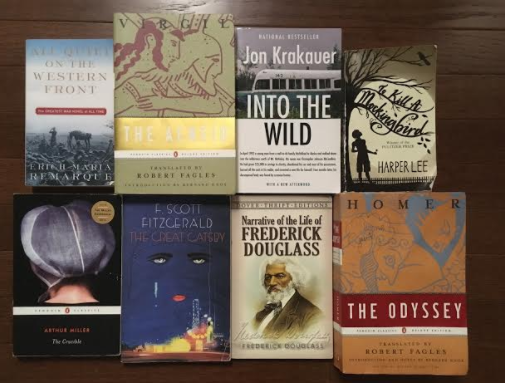The Honest Truth
When teachers assign reading, do students actually read the books they are supposed to?

Chapters one through 5 are due on Thursday.
Have up to part three read by the 20th.
Section two is due next class.
Any student in high school is no stranger to assigned reading and mandatory books. In addition to this, any student is also no stranger to the online resources that also exist. However, some students rely too heavily on the online resources, instead of actually reading the required text.
Coming into high school, it is every student’s opportunity to read some of the classics, like Romeo and Juliet, A Tale of Two Cities, The Odyssey, Frankenstein, and The Great Gatsby. Teachers assign students to read these stories and analyze their deeper meaning in class. The chance to read the books, even if they are longer than a short article that a teacher could have found, allow for students to have a more in-depth appreciation for the characters, plot, and overall theme.
In an age where so many students expect to have things quick and easy, it seems too taxing of a task to sit down and read an entire book. That time could be better spent… browsing social media? Going to Starbucks yet again? A book that is a whole 300 pages might seem overwhelming to students who only justify spending a maximum of five minutes on one article, especially for a class they may have mixed feelings about. But, the argument has to be made that it is important to read.
When teachers assign reading, some high school students find they do not have the time or desire to participate in such reading. Their fallback? SparkNotes, CliffNotes, or anything else they can find online. However, with taking these “shortcuts,” students are missing out on the chance to acquaint themselves with different styles of writing. Everything has not always been written in the modern-day English lingo, and by turning to SparkNotes or other online resources people are not allowing themselves to learn from the Old English of Shakespeare, or the tone established by an author writing in the 19th century.
When Ms. Brady, a former AP Language and Composition teacher and English 11 teacher at Oakton, was asked about her thoughts on these online resources, she stated, “I can understand where students are coming from when they look on SparkNotes or something, to see if other people have complementary views on what they were reading. But, I wouldn’t do it in lieu of reading the text.” Additionally, advice coming straight from Ms. Brady – don’t use the online resources to quote material. If one student is looking at the website, so are all of their classmates, and Ms. Brady warns against stating thoughts derived from the online resources because so is everyone else in their essays. In order to sound more intellectually significant, it is better to read and understand the book without turning to the online resources.
Additionally, part of the reasoning behind assigning students to read books is to prepare them for college. “As an English major, especially junior and senior year when I was only taking English classes, I would read a book per week per course – so with five courses, five books,” said Brady. If teachers don’t train their students to build that stamina through texts that challenge and exercise their students’ comprehension and analysis skills, they are setting the students up for failure.
Reading literature is important because it also conveys something historically monumental. Books like 1984 delve into vital topics such as censorship and government overreach, and books like The Narrative of the Life of Frederick Douglass teach us about slavery and the culture that existed prior to the Civil War. “If we don’t have these accounts of history and we don’t listen to these arguments made by these authors, we are going to repeat ourselves, repeat the things these people are warning against,” said Brady.
To be entirely fair, some students really do not enjoy reading at all. Additionally, some find that they really have no time. And while, yes, it might be true that students have enough time to read an entire book in one school night, teachers don’t assign students an entire book overnight. Especially for non-AP levels of English, teachers have pacing guides, reading quizzes, or allow time for students to read in class. “It’s really just part of the job to be reading outside of the classroom for classes like AP Language. For classes like English 11, where it’s more SOL geared, there are different expectations,” said Brady.
So really, know what the expectations are when signing up for classes and speaking with your counselor over the course of the next couple of weeks for English classes to know what you are ready for. Ask teachers how many books they will expect students to read, and know that you will benefit much more by actually reading those books. More than just reading to do well on an assignment or a seminar, reading also prepares you for college, and allows for you to gain a better knowledge of historical occurrences. Take the time to read, and don’t be lazy. Read the book.





